Welcome to our IG: Practice Question Series! You can find our posts with full explanations on Instagram. On this website we are also sharing additional links for reading related to each of our posts. Please get in touch if you have any questions!
Post #1 – Personal Questions



Post Description
Kia Ora! Welcome to the first of our many posts! We are really excited to bring you some MMI tips straight to your social media! Be sure to like/follow to stay up to date!
Personal questions are challenging as they are very open ended, however there are a few things the interviewers are looking for:
Do you have the qualities they want in a health professional?
Do you have a life outside of study?
Can you cope with stress?
Do you stand out compared to other applicants?
A good way to support your answer are anecdotes. They can demonstrate the answers to their main questions, make you memorable and are also easier for you to talk about, as they are experiences rather than complex scenarios you have to think through. They also add a level of authenticity to your answers.
Sell yourself but don’t go overboard – we all still have a lifetime of learning ahead of us. Arrogance and confidence are a fine line to walk. It can be a good idea to practice with your friends and family and get some honest feedback.
On the other extreme, don’t undersell yourself. You are a very competent and smart person and institutions don’t define your self worth or discount what you have achieved in your life.
Non-verbal: body language is important. Sit up straight and engage the interviewer. If using anecdotes, let your body language set the mood, if your story is coming from a hard place in your life let your tone reflect it. If the story is funny, have a little chuckle.
Additional Reading
https://www.indeed.com/career-advice/interviewing/interview-question-tell-me-about-yourself
https://www.seek.co.nz/career-advice/article/how-to-answer-so-tell-me-about-yourself
https://careersidekick.com/tell-me-about-yourself-interview-question-answer/
Post #2 - Ethics



Post Description
Ethics questions are challenging and present you with a few choices of sides to take, more often than not these will be controversial. In this case we use the example of euthanasia, an opinion-based topic in which there are no right or wrong answers. So, don’t worry about picking the side you think ‘the interviewer will like’.
Firstly, have an opinion! As mentioned before, there are no right or wrong answers, you have to however be able to justify your stance. For this answer, it is essential that you consider why people may agree and disagree with your stance. A good healthcare professional is open-minded and able to communicate with people who may hold different values and this is exactly what you’re being tested for.
The ethical principles of medicine are beneficence, non-maleficence, autonomy and justice. Research these and know what they mean as they add a lot to your answer. These are important as these are principles which all healthcare workers are to stand-by. The ability to use them in answers demonstrates that you are a person who is aware of and has an understanding of them, possesses critical judgement and has done their research for this interview.
Next up, you have to be able to understand why people think differently from you. Demonstrating this in an answer shows that you are an open person and that you are making your decision having already considered both sides. This adds validity to your own argument!
Another thing to think about is that regardless of whether you agree or disagree with euthanasia, the reality is that it is being conditionally legalized and it is important to show to the interviewer that you have an up-to-date knowledge of the important changes in the NZ health system.
Finally, the interviewer might not agree with you and that’s absolutely okay. These are tough questions and again there is no right or wrong opinion! In reality even if the interviewer does agree with you, they will likely ask tough follow up questions that may contradict the opinion you have given. If this occurs, keeping an open-mind is extremely important. Be considerate of the point they raised and again argue for and against.
Some good phrase for ethical questions are:
“I understand where you’re coming from, however..”
“Having considered the PROs and CONs of this side, I believe that..”
“While this option has very valid PROs, personally I believe the CONs outweigh them for the following reason..”
Additional Reading
https://www.health.govt.nz/our-work/regulation-health-and-disability-system/end-life-choice-act-implementation
https://en.wikipedia.org/wiki/2020_New_Zealand_euthanasia_referendum
https://www.lifechoice.org.nz/
https://themsag.com/blogs/medical-school-interviews/ethics-questions-asked-at-medical-interviews-euthanasia
Post #3 - NZ Health Issues
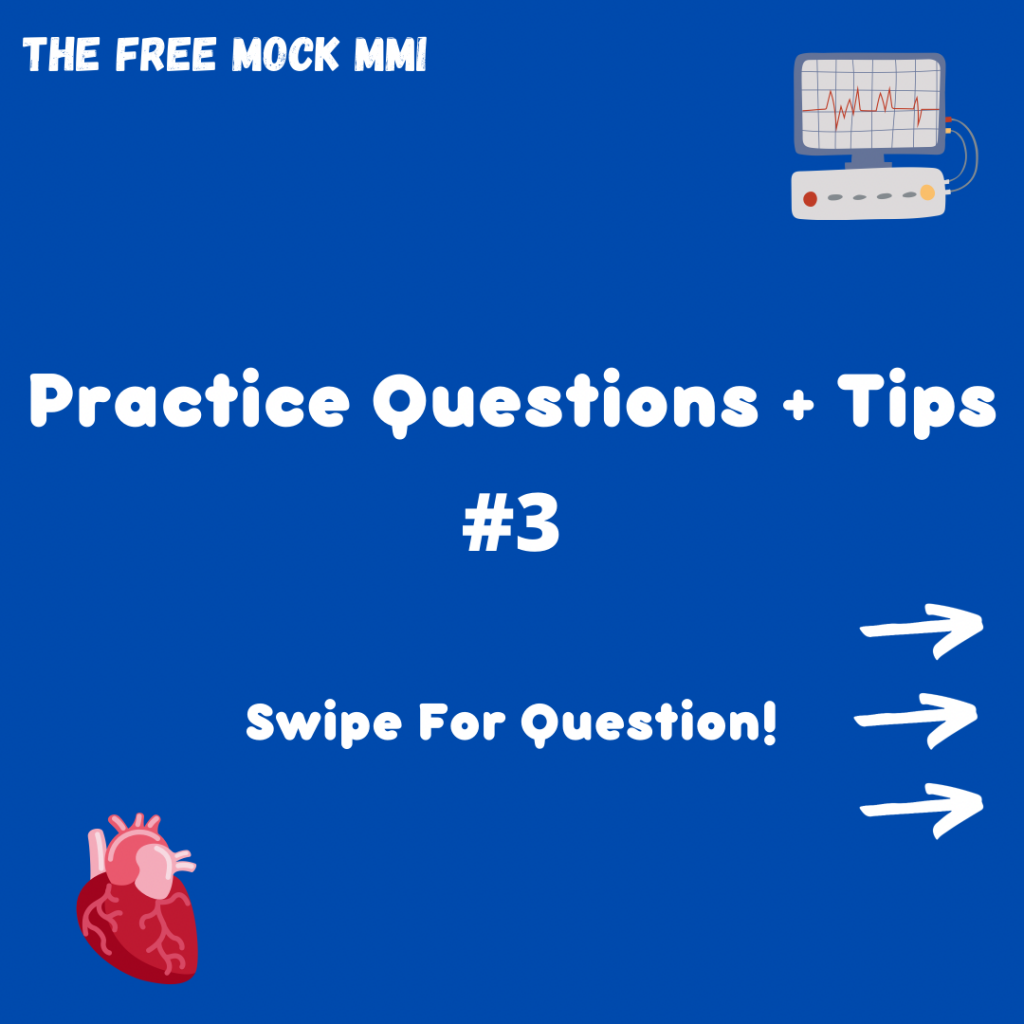
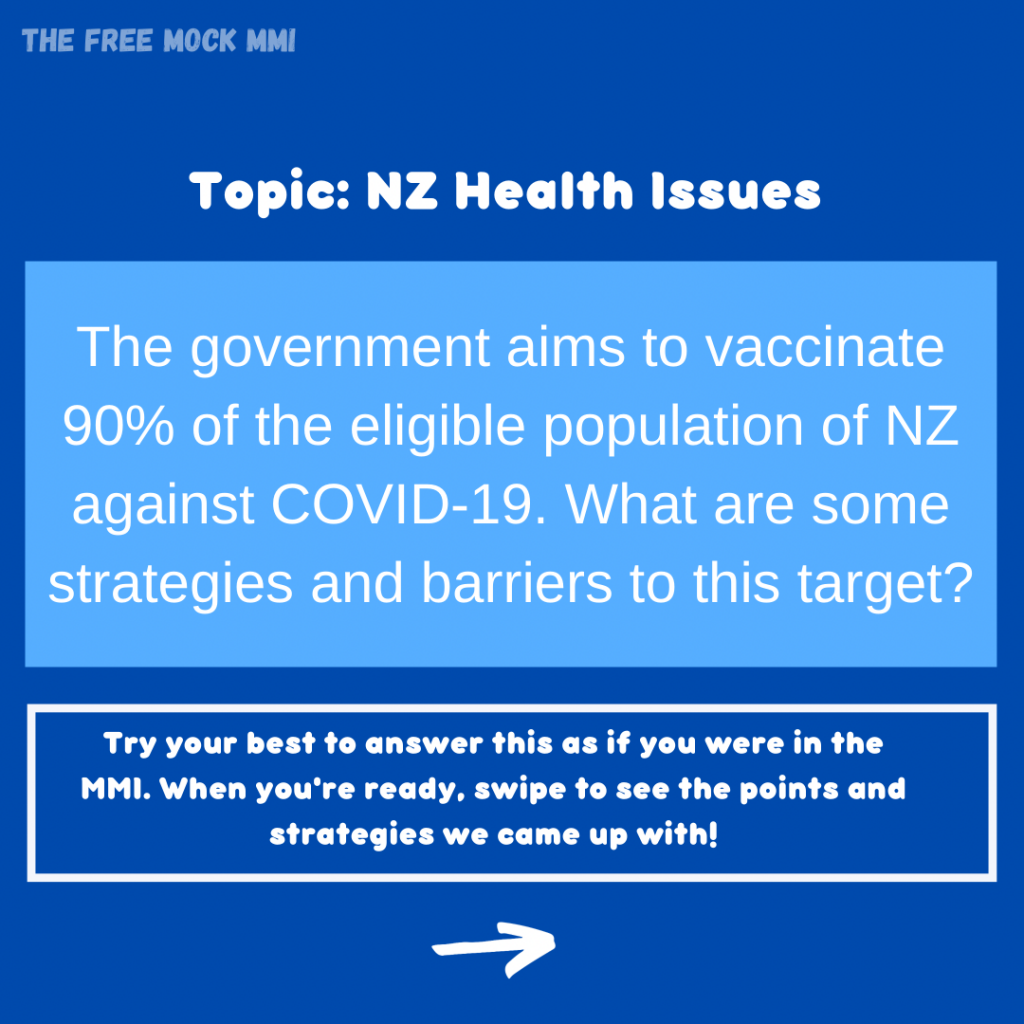
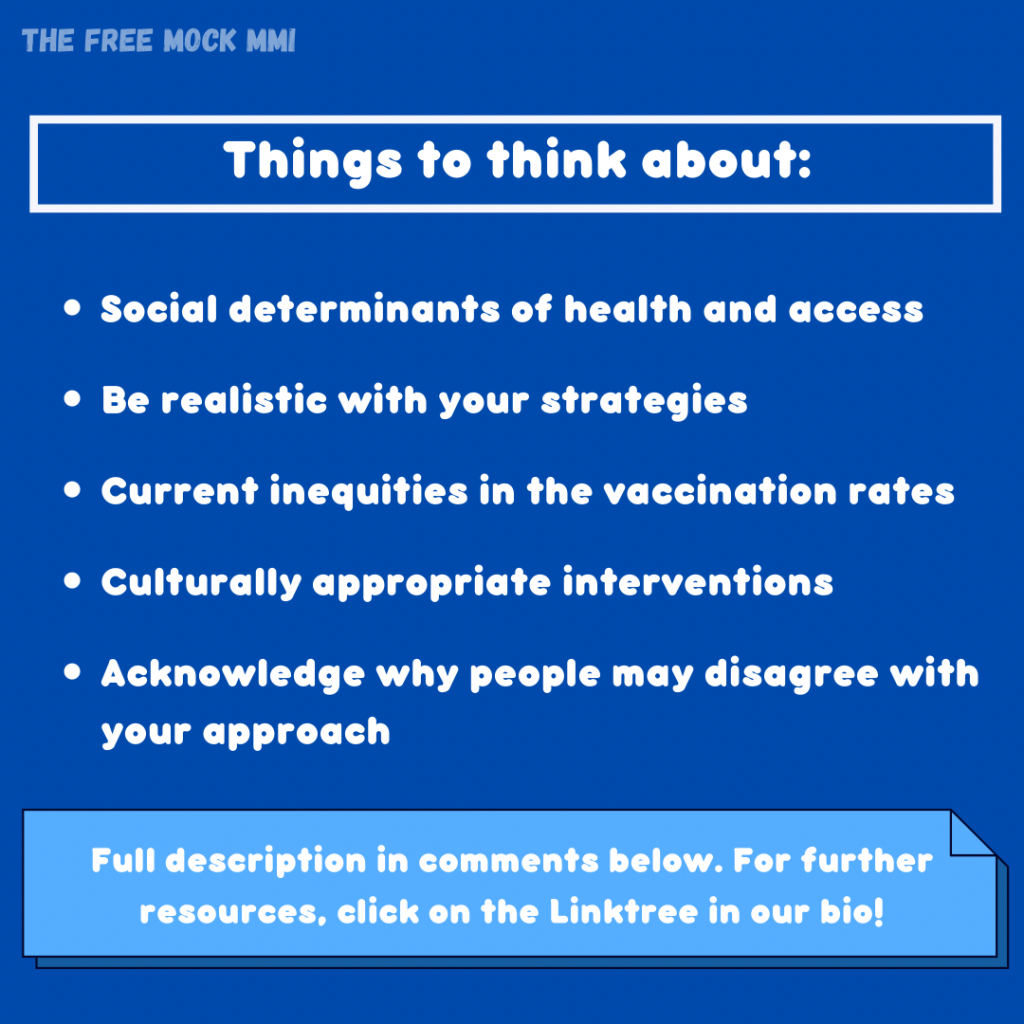
Post Description
Familiarise yourself with the social determinants of health (link below). How might they explain the barriers to accessing the vaccine? Are these barriers the same in all parts of New Zealand?
Consider realistic and equitable strategies to overcome these barriers. For example, vaccination buses for rural settings, pop-up vaccination centres within community buildings and schools, and at-home visits for those who need it.
Address the inequities; Māori and Pasifika populations have the lowest vaccination rates in NZ. Use frameworks such as the ‘5 A’s of access’ to explain these inequities. Consider Te Tiriti O Waitangi (and how this might be a violation of the third article) and the effects of colonisation.
Incorporating tikanga principles into the vaccination process, and providing Māori and Pasifika communities with autonomy over their health. Community-led initiatives should be prioritised, and as well as initiating discussions with leaders about how to best meet the needs of their communities.
If asked, you can acknowledge the fact that some people may see Māori and Pasifika vaccine initiatives as ‘prioritisation’ above Pākehā. However, this is an equitable approach. These views are raised generally due to a lack of education as to why Māori and Pasifika communities are more vulnerable to the virus in our current healthcare system.
Additional Reading
https://www.theaspiringmedics.co.uk/post/medical-school-interview-public-health-access-to-healthcare
https://www.healthnavigator.org.nz/clinicians/s/social-determinants-of-health/
Kia ora, David Seymour. Let’s talk about Māori, health and vaccination
How Māori and Pasifika groups are taking the vaccine message to whānau and aiga
Beyond 90% – the graphs that tell the story of our vaccination challenges
https://www.rnz.co.nz/news/te-manu-korihi/450893/maori-vaccine-equity-scheme-criticism-blows-back-on-seymour
https://www.health.govt.nz/news-media/news-items/vaccine-rollout-track-achieve-equitable-uptake-maori-and-pacific-peoples
https://www.nzma.org.nz/journal-articles/will-access-to-covid-19-vaccine-in-aotearoa-be-equitable-for-priority-populations-open-access
https://www.nzdoctor.co.nz/article/undoctored/reset-equity-first-dose-covid-19-vaccines-maori-and-pasifika
https://www.tvnz.co.nz/one-news/new-zealand/govt-defends-equity-covid-19-vaccine-rollout
Post #4 - Professionalism
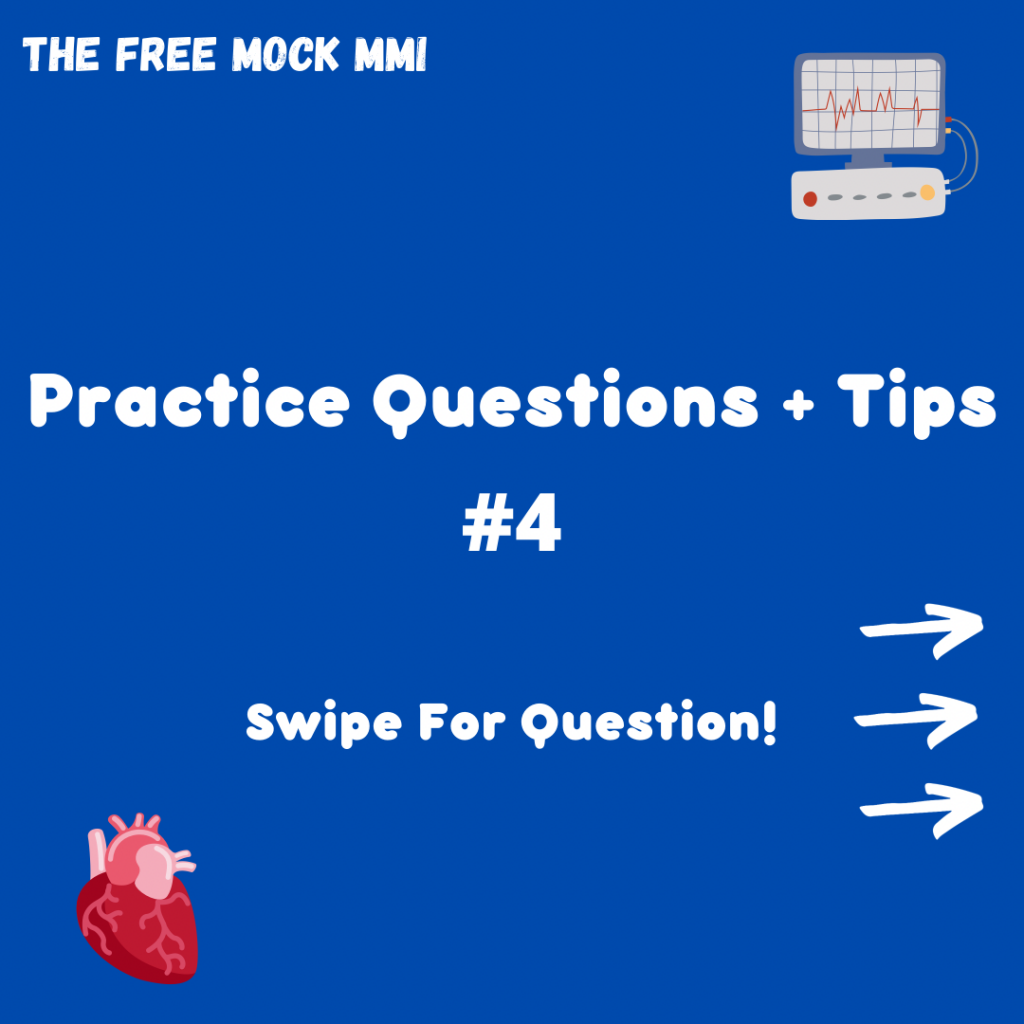
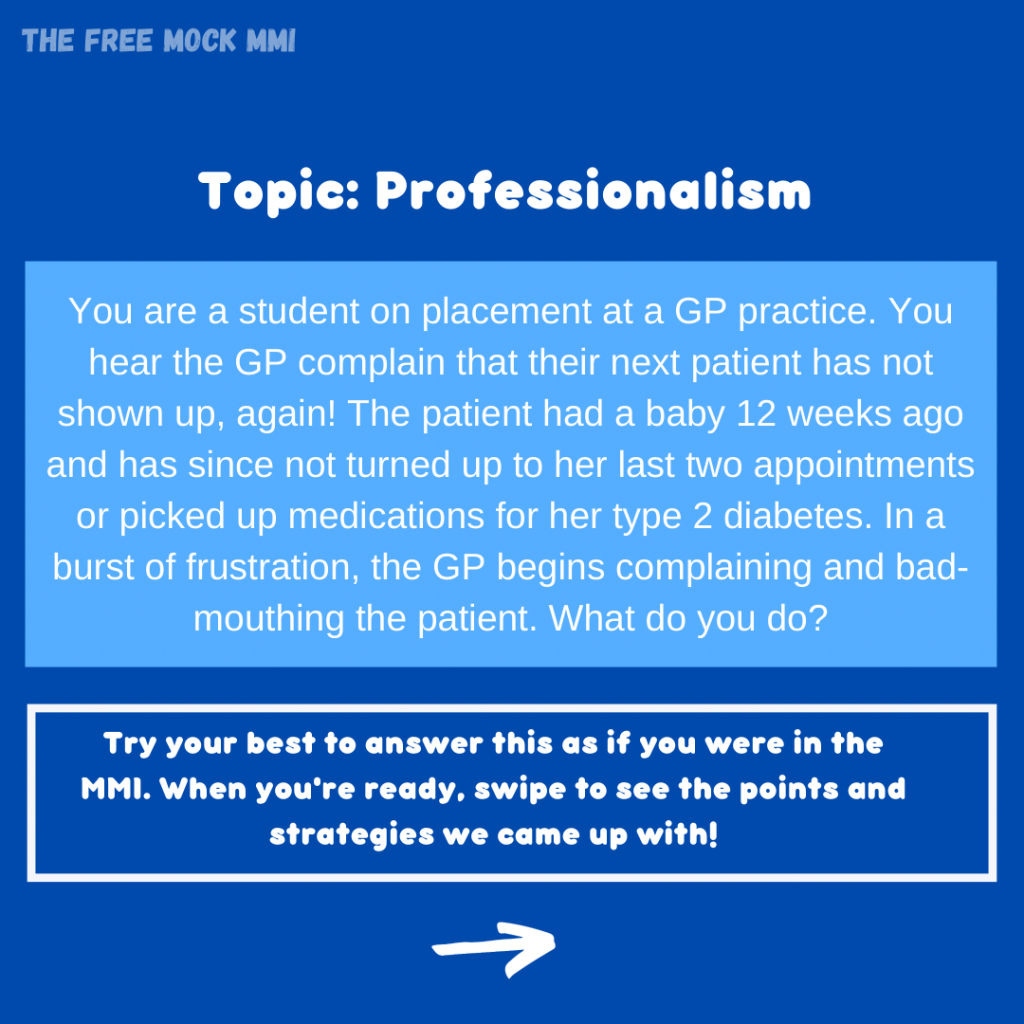
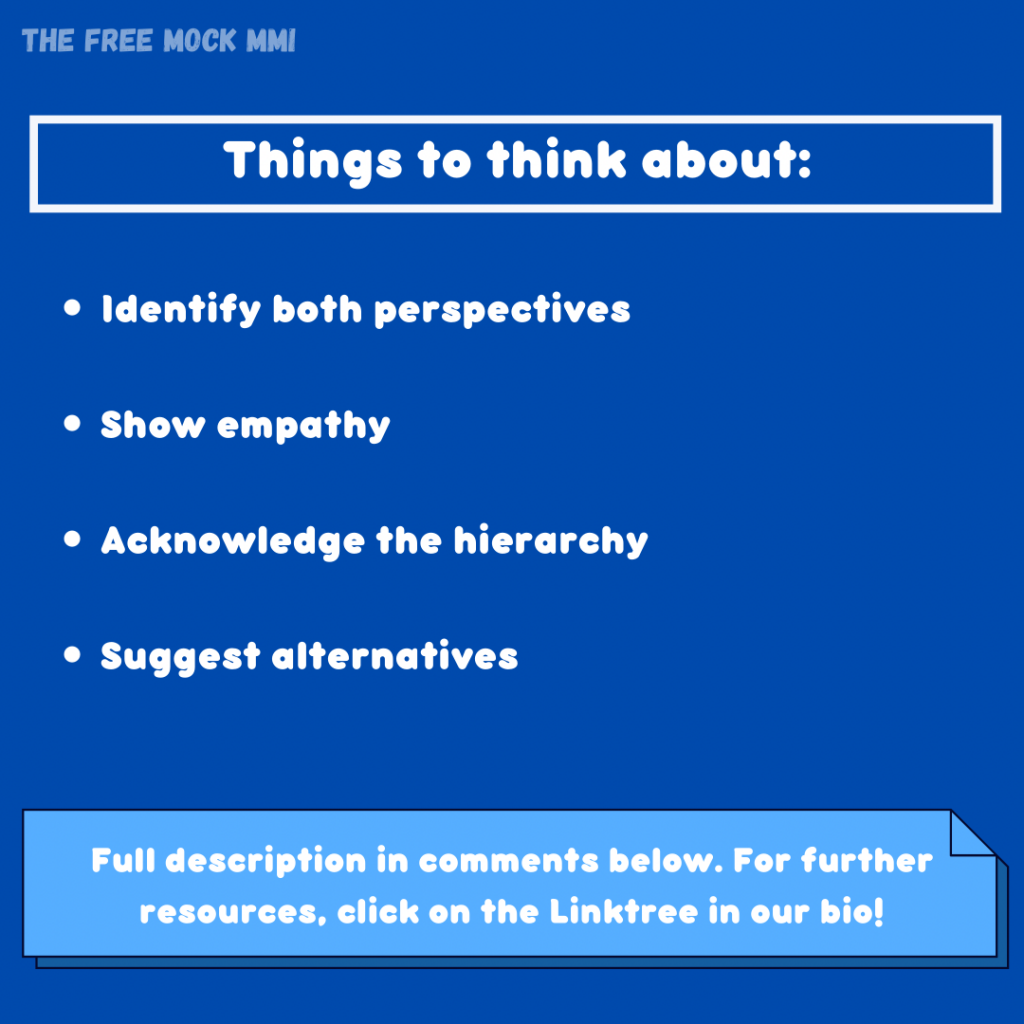
Post Description
Identify both perspectives and show empathy. The GP is frustrated and they are bad-mouthing a patient to a student, which should not be happening. However, on the other hand, we are all human and this does not mean that the GP is a ‘bad person’, they are likely frustrated that they can not help their patient. The GP is expressing concern for their patient, but is acting inappropriately by launching a personal attack on them.
The patient likely has reasons for why she could not turn up to the appointment, despite wanting to and potentially needing to. It is likely there are access barriers (The 5 A’s) to her accessing this appointment. The fact that she has been unable to pick up her medications is potentially an indicator that she is struggling. It is likely that she is prioritising other commitments in her life above her own healthcare, which is understandable.
It can be difficult for non-clinical students to understand the dynamic between a student and consultant, but sometimes there is a strict hierarchy in place. This can make it very difficult for students to feel comfortable voicing their opinions or discussing with seniors. Therefore, you might want to consider the difficulties of ‘calling out’ a highly qualified health professional as a student.
You might like to propose solutions to the issues raised in the stem. COVID-19 has shown us that online or phone consults can be successful in reaching patients to check up on them. If the patient is able to do so, you could suggest a phone consultation as an easier way to get in touch if they are having trouble getting to the practice. Or perhaps you could ask the patient if the script has been sent to a pharmacy that is easily accessible to them/within a short distance of where they live.
Additional Reading
Extra For experts:
Ethics
All ethical decisions in medicine depend on the following four principles:
Autonomy
Justice
Non-Maleficence
Beneficence
(All Judges Need Bread)
There are many other factors and laws which can come into play in difficult, real-life scenarios, but these four principles are the most important for you to understand before your interview. Here’s a quick summary of what they mean, and how that applies to the health practice:
Autonomy is the concept that allows patients to maintain their own right to accept and refuse treatment, and be involved in discussions about their treatment. It is about allowing the patient to decide what is best for them and make the final decisions about their treatment. Autonomy requires the patient to be competent [of a stable mind], and informed about all their treatment options. This principle can be difficult to respect when a patient is suffering from a condition where they are no longer deemed competent (e.g dementia).
Justice is the principle of weighing the ‘fairness’ of medical decisions, usually in terms of the wider population. It requires you to consider the application of resources and treatments in the case of your patient and whether that is ‘fair’ or cost-effective for other patients.
Non-maleficence is the official term for what everyone knows as “do no harm.” This is simple in the fact that the aim is for the medical practitioner to always do the best they can to ensure the patient receives the treatment which is least risky, or least likely to harm them. However, in practice this can be difficult to manage with patient expectations. For example, a patient who comes in with the flu should not be given antibiotics because it does not treat the viral cause, and is simply putting them at risk of having an adverse reaction to an antibiotic. However, health practitioners can feel pressured into prescribing the drug so the patient doesn’t get mad for not receiving a treatment when they expect to.
Beneficence is another official term for what we know as the health practitioner’s responsibility to “do good.” The health practitioner must do all they can to benefit the patient in each situation, including recommending procedures and treatments with the intention to do good for the patient.
Test yourself on using these principles to create strong answers for the following ethics questions [or can be like – refer to the ethics practice questions in the back of the booklet]
- You are the owner of a pharmacy. You notice that one of your customers, a young woman, keeps coming to your pharmacy for anti-constipation pills. You know that these pills can cause harmful effects if abused as ‘slimming aids’. What would you say to her?
The key point in this scenario is being non-judgemental, understanding, trying to show that you genuinely care about the woman’s wellbeing and providing information as best as you can. It is also good to mention the principles of autonomy, beneficence and non-maleficence.
The first best step in this scenario is for the pharmacist to ask the woman if they wouldn’t mind having a small consultation with them in another room so that they have privacy. I would then ask the woman, in a gentle and caring way, why she is buying so many of these pills and if she is potentially doing something else with them. It is possible she may be reluctant to talk about the issue, therefore I would do my best to show her that I am only trying to help and show compassion by expressing that.
If the woman doesn’t say anything, I would carefully ask if she is using them as slimming aids. If she then responds in any way that suggests that she is, I would explain the harmful effects of using these peoples for that purpose. I would make sure that she is aware that I am not trying to tell her off but rather trying to support her and make sure she does not hurt herself.
If she does confess that she has been using them in that way, I would try and help her find another way to lose weight, as that is something she clearly wants. I would suggest community exercise groups or maybe even Youtube videos which are free. I would ask her if she has anything in her support network that she can turn on for help with losing weight and general emotional support.
Additionally, I would also suggest she goes to see the GP to check if she has caused herself any harm with the pills and to generally help her achieve her goal in losing weight.
It could be good to use the “seeing both sides of the argument” here and mentioning that while approaching the woman could put her in an awkward situation, not approaching her might result in further harm.
- Your patient, who has cancer, wants to try traditional Maori medicine. How do you respond?
The key point in this scenario is being non-judgemental, understanding why the patient wants to try alternative therapy, and providing information as best as you can. It is also good to mention the principles of autonomy, beneficence and non-maleficence.
The first step in this scenario is for the doctor to find out more about what therapy the patient wants to try. For example, there is a massive difference between “I want to try mirimiri for pain relief” (a form of traditional massage) and “I want to cease all conventional treatment, and meditate”.
In general, assuming the alternative therapy does not interfere with standard therapy, it can be considered safe to use. Respect that for some patients, feeling like they are doing everything possible to help their treatment is just as important to their mental wellbeing as chemotherapy, surgery and radiotherapy are to their physical wellbeing and chance of cure.
You should also be aware that very sick patients may feel helpless and can be in a very vulnerable state. As a medical practitioner you are a source of advice and information and have a duty to protect your patient from people seeking to prey on that vulnerability. While you can advise against a potentially harmful treatment, you cannot threaten or force your patient to take or decline therapy.
One of the best answers here is to let the patient continue with their choice of therapy (as long as it is not harmful – non-maleficence) and thereby respecting their autonomy but also attempting to convince them to also take on the treatment you recommend which is proven to be effective.
Follow Up: Your patient wants to cease all conventional therapy in favour of alternative therapy. How do you respond?
You should warn your patient (non-judgementally) that the therapy they would like has no proven effects and that you recommend against it but that you also respect and will support them in their decision. At the end of the day, autonomy trumps what you believe is best.
Problem Solving Framework
When an interviewer asks you a question about a current health issue, we recommend using a broad problem solving framework to address the question. This will help you to avoid forgetting key topics and stop you from narrowing your answer too soon.
This problem solving framework is based around the mnemonic “ME BIGS”. You do not have to use this framework specifically, this example only shows you one of the many ways to approach an interview question. We recommend experimenting with different frameworks to find a style that works for you.
Your answer should explain how one would fix the underlying issue, or at least mentioning it is important, however no one expects you to fix NZ’s main health problems in a 6 minutes interview.
(ME BIGS)
Main issues prevalence
Recognising why the issue is important and how it is relevant to today’s social climate. This is your time to mention what you currently know on the topic and your awareness of its prevalence.
Equity
Health inequities are defined as differences which are unnecessary, avoidable and unjust. In society we often see health disparities between different social classes and ethnic groups. When we are discussing health disparities, it is easy to fall into the trap of victim blaming where we consider the individual as responsible for their situation. The victim blaming explanation is discouraged because it only works to sustain equality by removing accountability of the wider societal factors.
Broad underlying issues
Health outcomes are influenced by societal factors. This is your chance to analyse how the wider socio-economic risk factors influence health disparities. I suggest looking at the Dahlgren-Whitehead rainbow model to find some examples. The centre of this model discusses the risk factors that are proximal to the individual. As you move distally, the model discusses the wider societal factors like education and working environment which influences health outcomes.
Once you have identified the board underlying issues, I would discuss current interventions addressing this issue like
– Educational interventions: these could involve educating the individual, ourselves or society about how we can all help to reduce disease prevalence. This may require us to provide information that is culturally sensitive and recognition of knowledge gaps relating to culturally sensitive communication in healthcare.
– Policy interventions: strategies which facilitate changes on a political level. This can involve how health care systems operate and it often affects the individual’s environment without requiring personal commitment.
– Prevention interventions: these strategies can be on a societal level like vaccinations or at an individual level like enabling people to make personal change. The ideal change is to empower people to fight against the issue themselves, however, this is usually the most difficult part.
Individual risk factors
This is your time to discuss the individual risk factors and corresponding interventions. I would again recommend looking at the Dahlgren-Whitehead rainbow model if you are stuck for ideas. These can be the result of the underlying issues of material or structural deprivation, social selection, culture or behavioural influences and historical influences.
General impact on future practice
Discuss how this problem will be relevant to your future practice as a health professional and what you would do to address this issue. Even if the health problem is something large like climate change, as a health professional you can still be a mechanism for change because we can be voices of reason in society.
Summarise
If you have time remaining, this is a perfect chance to summarise your key points again and reflect on how this issue is relevant.
Here is how I would use the problem solving framework:
Question: Rheumatic Fever is the leading cause of acquired heart disease in childhood globally (and in NZ). Why is Rheumatic Fever a relevant issue in NZ?
Answer: Rheumatic Fever is a preventable infectious disease affecting a high proportion of NZ children which is surprising considering that we are a first world country. There is a combination of risk factors leading to a higher burden of untreated sore throat infections and therefore higher rates of RF among Māori communities and lower income families. This is due to the underlying issues of poverty, overcrowding, poor quality housing and racism…
Covid questions
- How did you manage to keep physically, emotionally and mentally fit during the lockdown? How did you adapt to lockdown?
- Do you think zoom appointments are the future of medicine?
- What do you think of New Zealand’s response to lockdown? What could we have done better? What country do you think had the ‘gold standard’ of management to the pandemic?
- What should we do to the people who breached the lockdown rules?
- Issues around people dying with limited or no family visitors?
- How would you respond if your patient refused to wear a mask and their sibling has just been diagnosed with SARs-CoV-19?
- Do you think it is appropriate that we limited the medication supplies to 1 month during the pandemic?
- Is it appropriate that we limited the numbers allowed to attend funerals, tangis and celebrations?
- Is it appropriate to cut physician salaries during a pandemic and a looming recession?
- A 17 year old with diabetes and a 45 year old with no known comorbidities are in your ER. You are the physician in charge. Both have tested positive for SARs-CoV-19 and both are presenting with respiratory deterioration. You have one bed in the ICU that has just become available. Who should get the bed?
- How would you respond if you were on the front line of the pandemic? What considerations would you consider most important? Whose safety is more important, yours or your patients? Do you feel competent to respond to this kind of pandemic?
Ethnicity
Links to good resources
If you want more interview questions (there is a lot of content on here that is not regulated so please take all of the information with a grain of salt): https://medstudentsonline.com.au/forum/threads/uoa-mmi-2019.35832/
If you want accurate information: https://www.auckland.ac.nz/en/fmhs/study-with-us/application-and-admission/mmi.html
If you want to know what the future might look like:
https://blog.mytuition.nz/high-school/a-guide-to-studying-medicine-in-new-zealand
Want to know more about vision 20:20: https://www.auckland.ac.nz/en/fmhs/study-with-us/vision-2020.html
The treaty in brief: https://nzhistory.govt.nz/politics/treaty/treaty-faqs
Improving Access to Health Care Among New Zealand’s Maori Population: https://www.ncbi.nlm.nih.gov/pmc/articles/PMC1470538/
Resource for understanding alcohol-related harm: http://www.ahw.org.nz/Issues-Resources/Vulnerable-Populations
Medical council of New Zealand current standards:https://www.mcnz.org.nz/our-standards/current-standards/